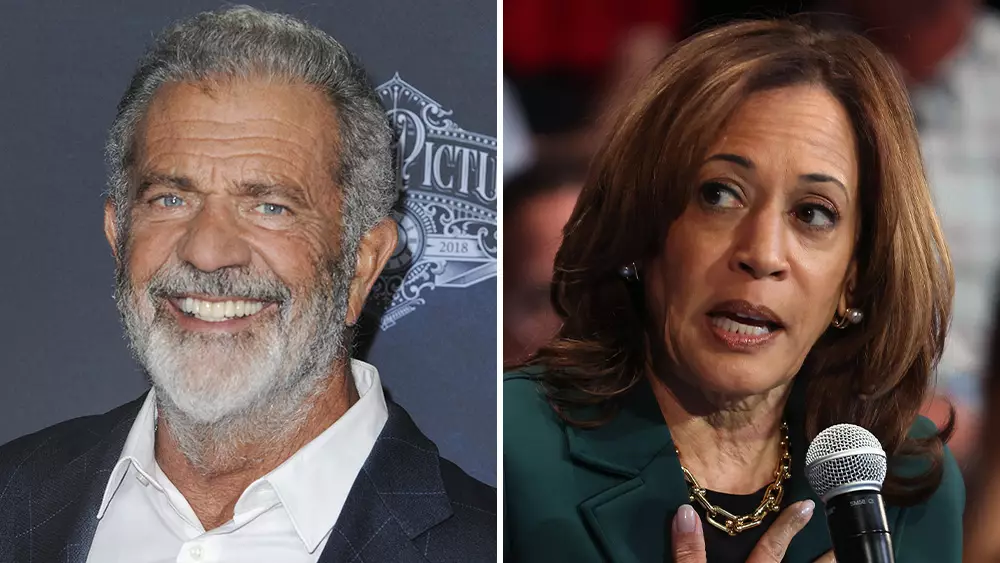In recent days, Mel Gibson has once again thrust himself into the spotlight, sparking debates and discussions about his controversial past and current remarks. Andrew Garfield’s recent comments praising Gibson for his “beautiful healing with himself” raises questions not only about the actor’s transformation but also about how society chooses to view individuals with a troubled history. Gibson’s latest comments regarding U.S. Vice President Kamala Harris illustrate the complexities of his character and bring to light the ongoing reckoning around public figures who have made headlines for their problematic behavior.
During an encounter with paparazzi at Los Angeles International Airport, Gibson offered a harsh critique of Kamala Harris, suggesting that she possesses the “IQ of a fence post.” Such demeaning language draws striking parallels to remarks made by former President Donald Trump, who has similarly attacked Harris’s intelligence. The timing of Gibson’s comments could not be more poignant, as they come at a time when national discourse about leadership and intelligence is particularly heated. This proclivity for making derogatory remarks raises eyebrows, especially considering Gibson’s long history of making offensive statements, including past anti-Semitic rants and misogynistic comments.
Despite Andrew Garfield’s effusive praise for Gibson’s “healing,” this most recent incident raises doubts about the authenticity of that transformation. It reveals a pattern of behavior that seems resistant to change, suggesting that maybe the lessons of the past have not been fully absorbed. How can we reconcile this perceived healing with Gibson’s current vitriol?
To understand Gibson’s current state, it is crucial to traverse the landscape of his tumultuous history. From his infamous drunk-driving arrest in 2006, wherein he unleashed a series of anti-Semitic remarks, to charges of domestic violence against his former partner Oksana Grigorieva, Gibson’s legacy is fraught with unsettling episodes. Acknowledgments of his transgressions came piecemeal through apologies, but the question remains: Is it sufficient to absolve one’s past through mere verbal acknowledgment?
Moreover, the recent remarks about Harris are not merely isolated incidents; they resonate with earlier incidents of derogatory behavior that have resulted in significant backlash. When Winona Ryder accused him of making anti-Semitic remarks at a Hollywood party, it seems as though the past is inextricably linked to the present. Within a few sentences, Gibson can evoke a complex blend of admiration and revulsion, revealing how engaged audiences are with celebrity narratives that fluctuate between redemption and condemnation.
Gibson’s declarations of support for Trump further complicate the narrative surrounding his public persona. The endorsement of a figure so polarizing and controversial seems to reinforce a mindset often criticized for its intolerance. When Gibson proclaimed that it “ain’t good” if the current VP won against Trump, he positioned himself not only as a filmmaker but also as a political commentator—an uncomfortable duality for a man with a checkered past.
While Gibson’s remarks about Harris echo sentiments previously articulated by Trump and his supporters, they also illuminate a broader trend within some segments of the entertainment industry. The normalization of hostile and derogatory remarks about political adversaries risks trivializing serious discussions surrounding race, gender, and leadership. Understanding the impact of celebrity rhetoric in political dialogue is essential as it shapes public opinion and, ultimately, affects electoral outcomes.
In the age of rapid information dissemination and social media, the words and actions of public figures are scrutinized like never before. Mel Gibson’s latest comments pose critical questions about redemption, accountability, and the ability to truly transform oneself. Andrew Garfield’s commendation of Gibson’s past healing now sits precariously against the backdrop of the actor-director’s latest disrespectful remarks, emblematic of a broader societal challenge: assessing whether public figures are genuinely rehabilitated or simply adept at navigating the complexities of celebrity culture.
As society grapples with the legacy of individuals like Gibson, it stands at a crossroads—seeking forgiveness yet demanding accountability. Ultimately, the question remains: Can one truly heal while perpetuating harmful rhetoric? The answer is as complex as the individuals in question themselves, leaving us to ponder the intricacies of morality, celebrity, and the human experience.

